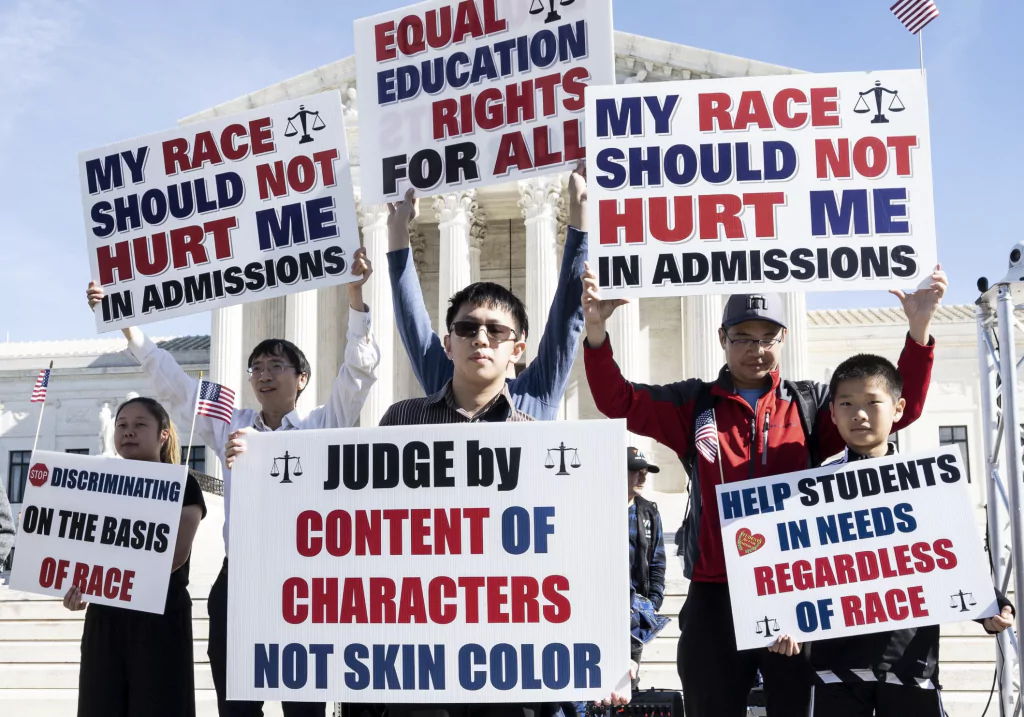
National Review’s report sheds light on the diminishing free inquiry in universities due to the administration’s one-sided support for affirmative action. As Aidan Stretch reported in National Review, universities have overlooked their commitment to intellectual diversity and free inquiry by aligning with one side of the affirmative action debate.

✅ AI Essay Writer ✅ AI Detector ✅ Plagchecker ✅ Paraphraser
✅ Summarizer ✅ Citation Generator
Key Takeaways:
- The recent Supreme Court ruling, which struck down affirmative action in higher education, has highlighted the lack of intellectual diversity in universities, as reported by Aidan Stretch in the National Review.
- Universities such as Harvard, Yale, and Princeton have been accused of amplifying student activism and favoring race-conscious admissions while failing to maintain an environment of free inquiry.
- Instead of sparking meaningful dialogue, the administration’s one-sided stance is potentially stifling the expression of differing opinions.
- Surveys by Gallup, the Knight Foundation, and the Yale Buckley Institute reveal that many students feel intimidated to express opposing views.
The Supreme Court Decision and the University Reaction
In a ground-breaking decision, the Supreme Court recently revoked affirmative action in higher education, sparking widespread student protests backed by university administrations.
Students protesting outside the Supreme Court, holding banners like “Race-Conscious Admissions Are Fair Admissions” and “Asian Americans for Affirmative Action,” received substantial support from their universities. This backing extended to financing protest efforts, such as the dean’s office at Yale College covering travel and overnight stays in Washington for 40 students and Harvard Undergraduate Association approving nearly $3,000 for the travel expenses of the Harvard Affirmative Action Coalition.
One-sided Activism Undermining Intellectual Diversity
Universities traditionally explain their support for affirmative action by highlighting the importance of diversity. They argue that race-conscious admissions policies cultivate a diverse intellectual environment, promoting a spirit of free inquiry and dialogue that sparks new insights. However, they risk undermining these very principles by favoring one-sided, pro-affirmative-action activism.
While student protests sponsored by universities aren’t new, the recent Supreme Court decisions have amplified them. Universities backing these protests have raised concerns over the diminishing climate of free expression and dialogue on campus. Their open support for specific viewpoints, while simultaneously claiming to champion diversity and free inquiry, creates a paradox that undermines their credibility.
Stifling Freedom of Expression on Campuses
Several studies corroborate the fear that one-sided university administrations are impinging on campuses’ free exchange of ideas. A 2020 Gallup and the Knight Foundation study revealed that 63% of students believed their campus climate prevented some people from expressing their views. Likewise, a survey by the Yale Buckley Institute in 2022 found that 58% of students felt intimidated to share opinions differing from their professors, while 63% were scared to voice thoughts contrasting with their peers.
These findings point to a larger issue at stake on college campuses – the jeopardization of spaces for inquiry, free expression, and diversity of thought. Universities’ actions in supporting one-sided protests and failing to facilitate open dialogues significantly contribute to this predicament.
An Appeal for Action
As universities prepare to welcome students in the new academic year, they face the challenge of redressing their actions. It’s time for faculties and administrators to step back from directly influencing campus discourse on contentious issues like affirmative action and let students form their own conclusions.
If universities genuinely believe in the “robust spirit of free inquiry” and “dialogue that sparks new insights,” as they claimed in their amicus brief last fall, they must prioritize actions that speak louder than their words. By promoting open dialogue and respecting diverse opinions, they can truly honor the principle of intellectual diversity.
Related stories:
Florida Declines Adoption of New Bar Exam Format in 2026
The Rise of NYU’s Selectivity in College Admissions
Schools Can Play a Key Role in Combatting Youth Mental Health Crisis
Follow us on Reddit for more insights and updates.





Comments (0)
Welcome to A*Help comments!
We’re all about debate and discussion at A*Help.
We value the diverse opinions of users, so you may find points of view that you don’t agree with. And that’s cool. However, there are certain things we’re not OK with: attempts to manipulate our data in any way, for example, or the posting of discriminative, offensive, hateful, or disparaging material.